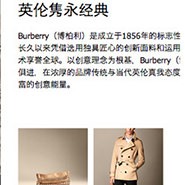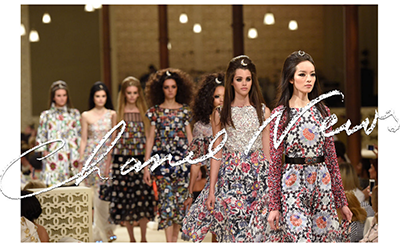 Burberry on Tmall
Burberry on Tmall
Although luxury growth in China went from 21 percent in 2012 to 2 percent in 2013, L2's latest China report asserts that the overall picture is rosier than this plunge suggests.
Swarovski, Piaget and Hugo Boss received top scores, while Stuart Weitzman, Oscar de la Renta and Yves Saint Laurent all ranked in the bottom 10, three of almost 70 brands who received feeble scores. The lackluster digital performance of so many brands belies the state of the country's ecommerce, which surpassed the United States in sales volume for the first time in 2013.
"It is surprising that luxury brands are still reluctant to invest digitally in China," said Emma Li, lead researcher of L2's report, New York. "Before venturing overseas to make luxury purchases, Chinese consumers demand three things: brand education, pricing transparency, and product availability.
"But only seven of the indexed brands that lack ecommerce capabilities display prices on their sites to help Chinese shoppers conduct pre-purchase research," she said. "Also important is to offer online concierge services. A third of watches and jewelry brands offer concierge services on product pages on their U.S. sites to aid in-store shopping, but just a quarter provide these services on their China equivalents.
"Brands simply can't afford to leave out such a simple yet important feature and risk turning off Chinese consumers."
L2's Digital IQ Index: Luxury – China examines the digital competence in China of 95 global and five local fashion, watches and jewelry brands across four dimensions of digital: Web site and ecommerce, social media, digital marketing and mobile and tablet.
Still a boon
China is expected to account for 30 percent of global luxury sales in 2014, according to Bain. The CLSA estimates that this figure will jump to 50 percent by 2020.
The country's plunging growth is not so ominous when seen from this angle. No longer emerging, China is poised to be the world's premier luxury market in the near future.
 Video still of Burberry WeChat runway customization
Luxury brands are responding to this shift by slowing down expansion plans and improving existing entities, both in-store and digital. L2's report explores the many digital areas in which brands need to improve if they intend to stay competitive.
Twenty-one percent of fashion brands sell online in China, compared to 79 percent in the United States, which is startling considering the online potential in the country.
As mentioned earlier, Chinese online shoppers outspent U.S. consumers for the first time in 2013 and are expected to spend $540 billion by 2015, according to KPMG.
Just seven of the brands who do not offer ecommerce have pricing information on their Web sites, which hampers consumer ability to research.
A report by BCG argues that Chinese consumers are more rigorous than consumers elsewhere when researching products. Ninety percent of product-related online activity is spent discerning the particular advantages of products. Around two-thirds of this time is spent on ecommerce sites (see story).
Search results for luxury brands on search engine Baidu have risen 36 percent from the year-ago period. Oscar de la Renta related searches rose 199 percent and Chanel became the most highly searched luxury brand, inspiring 12,745 daily searches.
Video still of Burberry WeChat runway customization
Luxury brands are responding to this shift by slowing down expansion plans and improving existing entities, both in-store and digital. L2's report explores the many digital areas in which brands need to improve if they intend to stay competitive.
Twenty-one percent of fashion brands sell online in China, compared to 79 percent in the United States, which is startling considering the online potential in the country.
As mentioned earlier, Chinese online shoppers outspent U.S. consumers for the first time in 2013 and are expected to spend $540 billion by 2015, according to KPMG.
Just seven of the brands who do not offer ecommerce have pricing information on their Web sites, which hampers consumer ability to research.
A report by BCG argues that Chinese consumers are more rigorous than consumers elsewhere when researching products. Ninety percent of product-related online activity is spent discerning the particular advantages of products. Around two-thirds of this time is spent on ecommerce sites (see story).
Search results for luxury brands on search engine Baidu have risen 36 percent from the year-ago period. Oscar de la Renta related searches rose 199 percent and Chanel became the most highly searched luxury brand, inspiring 12,745 daily searches.
 Chanel's China Web site
Less than 40 percent of examined brands come up as the first result on Baidu and 45 percent of brands fail to make it in the top three.
Ecommerce potential is further limited by the lack of ecommerce retailer Tmall shops. Burberry is the sole luxury brand based outside of China that has a Tmall shop, but 80 percent of studied brands can be found on Tmall.
The gray market afflicts many brands on Tmall, especially Armani and Swarovski, and elsewhere, which likely influences brand cautiousness.
Across the board, brands have failed to implement useful Web site tools such as store locators, consumer reviews and live chat.
"International brands need to be astutely aware of local brands' expertise in offering superior customer service and user engagement," Ms. Li said. "For example, Chow Tai Fook is the only brand in the watches and jewelry category that offers in-store pick up in China, and gives consumers the ability to customize products online and pick up offline.
"'Business as usual' just won't cut it anymore in the China luxury market," she said. "Consumers are becoming more demanding, and in many cases the only brands giving them what they want are local players."
Taking tolls
Among the feeble brands, Raymond Weil deteriorated the most from the year-ago period. The brand's score dropped 35 percent due to a shrinking Sina Weibo fan base and halted smart watch experimentation.
Dolce & Gabbana and Valentino both dropped 29 percent. Despite being the most searched brand on Baidu, Chanel fell 21 percent largely because it does not have a WeChat presence.
Fendi was a success story in this year's report. The Italian fashion label rose 48 percent to reach average territory on the wings of a newly designed Web site.
Piaget soared into gifted territory due to multichannel campaigns and a strong mobile strategy.
"Burberry really stands apart from many of its competitors," Ms. Li said. "The brand has become a pioneer in the market by offering direct-to-consumer ecommerce across APAC, and took a risk by launching an official Tmall store, despite criticism that a presence on the platform could damage Burberry's luxury status.
"However, Burberry's decision has already paid off, and was an incredibly smart move," she said. "Since the launch, all 6,443 gray market Burberry products have vanished from Tmall, and the only listed products on the platform are on the official Burberry store.
"This case study should be a lesson to other brands, which should consider following Burberry's lead and opening their own Tmall stores in order to combat the rampant gray market and take stronger control of their online presence in China."
Final Take
Joe McCarthy, editorial assistant on Luxury Daily, New York
Chanel's China Web site
Less than 40 percent of examined brands come up as the first result on Baidu and 45 percent of brands fail to make it in the top three.
Ecommerce potential is further limited by the lack of ecommerce retailer Tmall shops. Burberry is the sole luxury brand based outside of China that has a Tmall shop, but 80 percent of studied brands can be found on Tmall.
The gray market afflicts many brands on Tmall, especially Armani and Swarovski, and elsewhere, which likely influences brand cautiousness.
Across the board, brands have failed to implement useful Web site tools such as store locators, consumer reviews and live chat.
"International brands need to be astutely aware of local brands' expertise in offering superior customer service and user engagement," Ms. Li said. "For example, Chow Tai Fook is the only brand in the watches and jewelry category that offers in-store pick up in China, and gives consumers the ability to customize products online and pick up offline.
"'Business as usual' just won't cut it anymore in the China luxury market," she said. "Consumers are becoming more demanding, and in many cases the only brands giving them what they want are local players."
Taking tolls
Among the feeble brands, Raymond Weil deteriorated the most from the year-ago period. The brand's score dropped 35 percent due to a shrinking Sina Weibo fan base and halted smart watch experimentation.
Dolce & Gabbana and Valentino both dropped 29 percent. Despite being the most searched brand on Baidu, Chanel fell 21 percent largely because it does not have a WeChat presence.
Fendi was a success story in this year's report. The Italian fashion label rose 48 percent to reach average territory on the wings of a newly designed Web site.
Piaget soared into gifted territory due to multichannel campaigns and a strong mobile strategy.
"Burberry really stands apart from many of its competitors," Ms. Li said. "The brand has become a pioneer in the market by offering direct-to-consumer ecommerce across APAC, and took a risk by launching an official Tmall store, despite criticism that a presence on the platform could damage Burberry's luxury status.
"However, Burberry's decision has already paid off, and was an incredibly smart move," she said. "Since the launch, all 6,443 gray market Burberry products have vanished from Tmall, and the only listed products on the platform are on the official Burberry store.
"This case study should be a lesson to other brands, which should consider following Burberry's lead and opening their own Tmall stores in order to combat the rampant gray market and take stronger control of their online presence in China."
Final Take
Joe McCarthy, editorial assistant on Luxury Daily, New York
